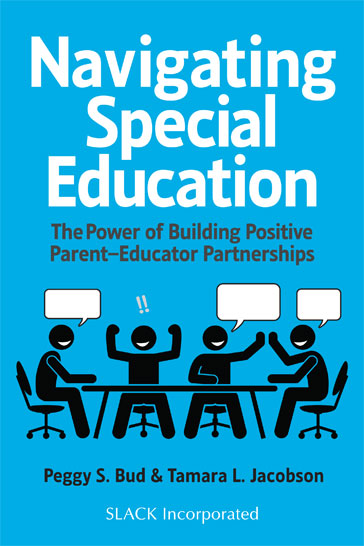Navigating Special Education: Building Positive Parent-Educator Partnerships provides insights, easy-to-use strategies, and a new grounded framework for successfull building parent-teacher relationships.
Student success is directly linked to the parent-educator
relationship. However, an imbalance exists within this relationship. Teachers
see themselves as experts, and parents tend to feel intimidated to speak up.
Teachers tell the parents what their child is learning and what teaching
strategies are being implemented. As educational experts, teachers might think
they can identify a child’s strengths and weaknesses, and many times they can.
Furthermore, parents are expected to listen to their child’s teacher, not ask questions, and accept that their recommendations are correct. However, parents often have vital input and expertise in their children's education. Due to this imbalance, parents often feel their voices aren’t heard, and their opinions aren’t considered.
During many Individual Education Planning Meetings (IEP meetings), parents and educators need to effectively communicate with one another, making communication the missing link in the meeting. If communication breakdowns occur, everyone tends to stop listening, and discussions turn adversarial. Ineffective communication can impact a team’s ability to co-create the child’s Individual Education Plan (IEP), goals and objectives, program, and placement.
A meaningful relationship between parents and educators will evolve positively and constructively when they understand the value of forging a significant partnership with one another. Navigating Special Education highlights WHAT happens when those partnerships are formed:
- Meetings are conversations rather than monologues.
- Empathy and understanding of everyone’s perspective occur.
- Monetary resources are spent on teacher instruction and student learning.
- Meetings are productive rather than stressful.
- The IEP Team creates a shared vision.
- A third voice emerges.
- The Individual Education Plan (IEP) is co-created.
Navigating Special Education also highlights HOW the effectiveness of communicating as partners. This book provides readers with easy-to-use strategies for building parent-educator partnerships. Bud and Jacobson explain their original grounded theory, the 5-C Model of Communication—Conversations, Collaboration, Cooperation, Compromise, and Consensus. Throughout the text and the case studies, Bud and Jacobson elaborate on how parents’ and teachers’ use of the 5-C Model will lead to open and honest dialogues, the development of a shared vision, and active listening and perspective-taking playing essential roles in their conversations.
As partners, the IEP team identifies the child’s needs, has meaningful and authentic conversations, collaborates, and is willing to compromise to reach a consensus if needed. By forging a positive relationship, everyone feels valued. The parent-teacher relationship becomes more balanced. Meetings are less stressful and less likely to turn adversarial. Everyone has a voice. As partners, the Individual Education Planning (IEP) Team promptly reaches the end game and co-creates the child’s IEP.
The child is the winner!


